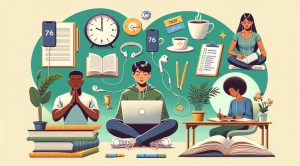8 Uncommon Skills That Give Students a Competitive Edge
8 Uncommon Skills That Give Students a Competitive Edge
Mastering uncommon skills can dramatically improve academic performance, personal efficiency, and adaptability. While many students focus on typical abilities, developing less common skills—often used by top gamers—can set learners apart. These 8 uncommon skills are practical, actionable, and easy to integrate into your daily routine, helping you solve complex problems, collaborate effectively, and adapt to new challenges. Students who practice these uncommon techniques consistently gain a competitive advantage both in studies and life.
For insights on applying focus, strategy, and efficiency in high-pressure environments, check out GamingNewsHead to see how elite gamers develop skills that boost reaction time, decision-making, and problem-solving. Additionally, explore Coursera to build advanced abilities that enhance academic and professional outcomes.
1. Speed Reading
Reading quickly without losing comprehension is an uncommon skill. Just like gamers process fast-moving screens and anticipate multiple actions, students can scan and understand information faster, improving efficiency. By training your eyes and brain, comprehension rates increase, and study sessions become significantly more productive, allowing more material to be retained in shorter periods.
Tip: Practice scanning for keywords, grouping words, and reducing subvocalization. Digital exercises and online courses can enhance this distinctive ability gradually, ensuring consistent improvement over time.
2. Critical Questioning
Asking insightful questions is an uncommon skill that strengthens analytical thinking. Gamers often anticipate opponents’ moves strategically—students can similarly analyze material deeply, challenge assumptions, and critically evaluate information to enhance understanding. This rare skill fosters curiosity and problem-solving, helping learners go beyond memorization to grasp underlying concepts effectively.
Tip: Challenge assumptions, ask “why” and “how,” and explain ideas to peers. This unique mindset boosts understanding, retention, and application in exams or projects, building long-term competence.
3. Mind Mapping
Visual organization of ideas is an uncommon skill that aids memory, problem-solving, and information synthesis. Like gamers tracking multiple objectives simultaneously, mind mapping links concepts visually, revealing relationships that simplify complex topics. This rare method encourages creative thinking while allowing students to structure knowledge efficiently.
Tip: Use colors, diagrams, and branching structures. Tools like MindMeister or Miro enhance this distinctive strategy, making revision sessions faster and more effective for retaining key details.
4. Adaptability
Being flexible in methods or problem-solving is another uncommon skill. Gamers adjust strategies quickly under pressure—students who adapt similarly handle new topics, unexpected assignments, or changes in learning environments effectively. Adaptability reduces stress, improves resilience, and allows students to maintain consistent performance despite challenges.
Tip: Experiment with study techniques, reflect on results, and embrace feedback. This rare trait strengthens coping mechanisms and ensures continuous learning even in dynamic situations.
5. Data Interpretation
Analyzing charts, tables, and patterns is an uncommon skill. Gamers use data to optimize performance—students can interpret statistics, research results, and experimental outcomes to make informed decisions. This distinctive skill enhances problem-solving, research accuracy, and analytical thinking across subjects.
Tip: Examine trends, summarize findings, and question anomalies to strengthen this rare ability. Consistent practice ensures understanding, speed, and reliability when working with complex information.
6. Focused Attention
Sustained attention under pressure is an uncommon skill. Gamers maintain high focus during intense matches, reacting quickly to changing situations. Students can apply similar methods for long study sessions, improving comprehension, retention, and task completion. Strong concentration allows for deeper understanding and prevents mistakes caused by distraction.
Tip: Use short, timed sessions like the Pomodoro technique to maintain high concentration. Remove interruptions, set goals, and practice mindfulness to develop this distinctive ability efficiently.
7. Visualization Techniques
Visualizing concepts, goals, or solutions enhances memory, planning, and problem-solving, making it an uncommon skill. Gamers often mentally rehearse strategies—students can use visualization to plan essays, solve equations, or understand processes. This rare skill strengthens recall and creative thinking while improving overall study efficiency.
Tip: Sketch diagrams, imagine steps mentally, or use storyboards. This unique approach turns abstract ideas into concrete mental representations, boosting understanding and retention of complex material.
8. Quick Note-Taking
Efficient note-taking is an uncommon skill that ensures key information is captured without losing focus. Gamers track in-game stats—students can track essential points similarly, making review faster and more effective. Mastery of this rare skill improves information retention and study efficiency simultaneously.
Tip: Use bullet points, shorthand, or apps like Notion or Evernote. Practicing this distinctive skill ensures every session is productive, organized, and useful for long-term reference.
Final Thought
These 8 uncommon skills, inspired by strategies used by top gamers, can dramatically improve learning, problem-solving, and adaptability. Small, consistent practice turns them into lifelong advantages. For more strategies, guides, and practical tips to strengthen diverse abilities, explore StudySkillUp and unlock your full potential. Additionally, visit Coursera to enhance skills systematically and apply them to academic or professional growth opportunities.
Education Made Simple

Study Focus Techniques That Actually Work
Study Focus Techniques That Actually Work

Learning Skill Awareness For Smarter Study Choices
Learning Skill Awareness For Smarter Study Choices












